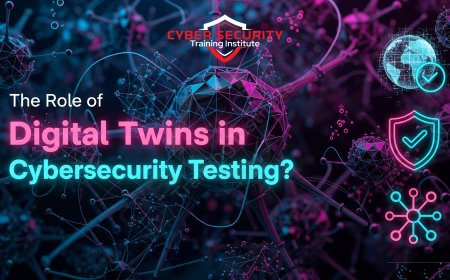Top 10 Ethical Hackers of All Time
Discover the top 10 ethical hackers of all time, their contributions to cybersecurity, and how to start your ethical hacking journey with Cyber Security Training Institute.

In the ever-evolving world of cybersecurity, ethical hackers—often referred to as white-hat hackers—play a pivotal role in safeguarding digital infrastructures. These skilled professionals use their expertise to identify vulnerabilities, strengthen defenses, and protect organizations from malicious cyberattacks. At Cyber Security Training Institute, we celebrate the contributions of ethical hackers who have shaped the industry through innovation, advocacy, and groundbreaking discoveries. This article explores the top 10 ethical hackers of all time, their remarkable achievements, and how their work continues to inspire the next generation of cybersecurity professionals.
Table of Contents
- Introduction to Ethical Hacking
- Criteria for Selection
- Top 10 Ethical Hackers of All Time
- The Impact of Ethical Hackers on Cybersecurity
- How to Become an Ethical Hacker
- Frequently Asked Questions (FAQs)
- Conclusion
Introduction to Ethical Hacking
Ethical hacking, also known as white-hat hacking or penetration testing, involves legally probing systems, networks, and applications to uncover vulnerabilities before malicious hackers exploit them. Unlike black-hat hackers, who operate with harmful intent, ethical hackers work with permission to enhance security, protect sensitive data, and fortify digital defenses. Their contributions have been instrumental in shaping modern cybersecurity practices, from developing secure software to advocating for responsible vulnerability disclosure. At Cyber Security Training Institute, our training programs empower aspiring ethical hackers with the skills to combat cyber threats effectively.
Criteria for Selection
Selecting the top 10 ethical hackers of all time required evaluating their impact on cybersecurity, contributions to the community, and recognition in the field. The criteria include:
- Innovative Contributions: Development of tools, methodologies, or frameworks that advanced cybersecurity.
- Industry Impact: Influence on security practices, policies, or standards.
- Community Engagement: Contributions through education, mentorship, or advocacy.
- Recognition: Awards, certifications, or acknowledgments from reputable organizations.
The following list highlights individuals who have left an indelible mark on the cybersecurity landscape.
Top 10 Ethical Hackers of All Time
1. Kevin Mitnick
Once dubbed the “Most Wanted Computer Criminal in US History,” Kevin Mitnick transitioned from black-hat hacking to becoming a leading ethical hacker and security consultant. In the 1980s and 1990s, Mitnick gained notoriety for infiltrating systems of major corporations like IBM and Motorola. After serving time, he founded Mitnick Security Consulting, helping organizations secure their networks. His books, including The Art of Deception, emphasize social engineering and ethical hacking techniques. Mitnick’s journey underscores the power of redemption and expertise in strengthening cybersecurity.
2. Charlie Miller
Charlie Miller is renowned for his groundbreaking work in vulnerability research, particularly in mobile and automotive security. He gained fame for hacking Apple’s iPhone and MacBook, exposing critical flaws that led to improved security protocols. Miller’s work on car hacking, including remotely controlling a Jeep Cherokee, highlighted vulnerabilities in IoT devices. His contributions to the Pwn2Own competition and publications like The Mac Hacker’s Handbook have made him a cybersecurity icon.
3. Tsutomu Shimomura
Tsutomu Shimomura played a pivotal role in apprehending Kevin Mitnick in 1995 after Mitnick hacked his systems. A computational physicist and security researcher, Shimomura’s expertise in tracking cyberattacks helped law enforcement trace Mitnick’s activities. His book, Takedown, details this high-profile pursuit. Shimomura’s work demonstrated the importance of ethical hacking in combating cybercrime and protecting critical systems.
4. Ankit Fadia
Ankit Fadia, an Indian ethical hacker, gained recognition at a young age for his books on ethical hacking and cybersecurity, such as The Unofficial Guide to Ethical Hacking. He has trained thousands of students and professionals through workshops and seminars, promoting cybersecurity awareness in India. Fadia’s contributions include consulting for government agencies and corporations, making him a prominent figure in the Indian cybersecurity landscape.
5. Joanna Rutkowska
Joanna Rutkowska is a pioneer in rootkit detection and system security. She developed the Blue Pill, a proof-of-concept rootkit showcasing virtualization-based malware, which sparked advancements in hypervisor security. As the founder of Invisible Things Lab, Rutkowska focuses on secure operating systems like Qubes OS, designed to enhance user privacy and security. Her work has significantly influenced modern cybersecurity research.
6. Chris Wysopal
Chris Wysopal, also known as “Weld Pond,” co-founded Veracode, a leading application security company. A member of the hacker collective L0pht, Wysopal testified before the U.S. Senate in 1998, highlighting the need for better cybersecurity practices. His work on tools like L0phtCrack and contributions to secure software development have made him a key figure in ethical hacking.
7. Parisa Tabriz
Known as Google’s “Security Princess,” Parisa Tabriz leads the company’s security engineering team, overseeing initiatives like Project Zero, which identifies zero-day vulnerabilities in widely used software. Tabriz’s efforts have strengthened the security of Google’s products and influenced global cybersecurity standards. Her advocacy for diversity in tech and ethical hacking inspires aspiring professionals worldwide.
8. Barnaby Jack
Barnaby Jack was a legendary ethical hacker known for his work on hardware and IoT security. He gained fame for “jackpotting” ATMs, demonstrating how they could be hacked to dispense cash remotely. Jack’s research on medical device vulnerabilities, such as insulin pumps, highlighted critical risks in healthcare security. His untimely passing in 2013 was a loss to the cybersecurity community, but his legacy endures.
9. HD Moore
HD Moore is the creator of Metasploit, an open-source penetration testing framework widely used by ethical hackers to test system vulnerabilities. As a security researcher, Moore’s work at Rapid7 and his contributions to vulnerability scanning tools like Nexpose have advanced penetration testing practices. His tools remain essential for cybersecurity professionals globally.
10. Katie Moussouris
Katie Moussouris pioneered bug bounty programs, establishing Microsoft’s first program and contributing to the U.S. Department of Defense’s “Hack the Pentagon” initiative. As the founder of Luta Security, she promotes responsible vulnerability disclosure and diversity in cybersecurity. Moussouris’s efforts have bridged the gap between hackers and organizations, fostering collaboration to enhance security.
The Impact of Ethical Hackers on Cybersecurity
Ethical hackers have transformed cybersecurity by proactively identifying vulnerabilities, developing innovative tools, and advocating for stronger security practices. Their contributions include:
- Vulnerability Disclosure: Programs like bug bounties, pioneered by hackers like Moussouris, encourage responsible reporting of flaws.
- Tool Development: Tools like Metasploit (Moore) and L0phtCrack (Wysopal) empower ethical hackers to test and secure systems.
- Policy Influence: Testimonies like Wysopal’s before the U.S. Senate have shaped cybersecurity regulations.
- Public Awareness: Books, workshops, and talks by hackers like Mitnick and Fadia educate the public and professionals.
These efforts have made organizations more resilient to cyberattacks, protecting sensitive data and critical infrastructure.
How to Become an Ethical Hacker
Aspiring to join the ranks of these legendary ethical hackers? At Cyber Security Training Institute, we offer comprehensive training to kickstart your career. Here’s a roadmap to becoming an ethical hacker:
- Learn the Basics: Gain knowledge of networking, operating systems (Linux/Windows), and programming (Python, C++).
- Master Ethical Hacking Tools: Familiarize yourself with tools like Nmap, Wireshark, and Metasploit.
- Earn Certifications: Pursue credentials like Certified Ethical Hacker (CEH), OSCP, or CompTIA PenTest+.
- Practice in Safe Environments: Use platforms like Hack The Box, TryHackMe, or VulnHub for hands-on experience.
- Join the Community: Engage in forums, attend conferences like DEF CON, and participate in Capture The Flag (CTF) challenges.
- Stay Updated: Follow cybersecurity trends, including AI-driven attacks and IoT security.
Enroll in our Ethical Hacking Course at Cyber Security Training Institute to gain hands-on skills and mentorship from industry experts. Call +91 90310 44394 to book a free demo class today!
Frequently Asked Questions (FAQs)
1. What is ethical hacking?
Ethical hacking involves legally testing systems to identify and fix vulnerabilities, enhancing security with permission.
2. How does ethical hacking differ from malicious hacking?
Ethical hacking is authorized and aims to improve security, while malicious hacking exploits vulnerabilities for harm.
3. Who is considered the most famous ethical hacker?
Kevin Mitnick is often cited as the most famous due to his high-profile past and contributions as a security consultant.
4. What tools do ethical hackers use?
Common tools include Metasploit, Nmap, Wireshark, Burp Suite, and Kali Linux.
5. Can anyone become an ethical hacker?
Yes, with dedication, technical skills, and proper training, anyone can pursue a career in ethical hacking.
6. What certifications are best for ethical hacking?
Top certifications include CEH, OSCP, CompTIA PenTest+, and CISSP.
7. What is a bug bounty program?
A bug bounty program rewards ethical hackers for finding and reporting vulnerabilities in an organization’s systems.
8. How did Kevin Mitnick become an ethical hacker?
After serving time for illegal hacking, Mitnick became a security consultant, helping organizations secure their systems.
9. What is Metasploit, and who created it?
Metasploit is a penetration testing framework created by HD Moore, used to test system vulnerabilities.
10. Why is ethical hacking important?
It helps organizations identify and fix security weaknesses before malicious hackers can exploit them.
11. What is the role of AI in ethical hacking?
AI enhances ethical hacking by automating vulnerability scans and analyzing complex attack patterns.
12. How did Charlie Miller impact mobile security?
Miller exposed vulnerabilities in Apple’s iPhone and MacBook, leading to improved security protocols.
13. What is a zero-day vulnerability?
A zero-day vulnerability is an unknown flaw in software that has no patch, making it exploitable.
14. How do ethical hackers contribute to IoT security?
They identify vulnerabilities in IoT devices, as demonstrated by Barnaby Jack’s work on ATMs and medical devices.
15. What is penetration testing?
Penetration testing simulates cyberattacks to identify and fix vulnerabilities in systems or networks.
16. Can ethical hacking guarantee a secure system?
No system is 100% secure, but ethical hacking significantly reduces risks by identifying weaknesses.
17. What is the Cyber Kill Chain?
The Cyber Kill Chain is a framework outlining the stages of a cyberattack, used by ethical hackers to simulate attacks.
18. How do I start learning ethical hacking?
Begin with online platforms like Hack The Box, TryHackMe, or courses from Cyber Security Training Institute.
19. What is the OWASP Top 10?
The OWASP Top 10 is a list of the most critical web application security risks, used by ethical hackers to prioritize testing.
20. How can I join a bug bounty program?
Register on platforms like HackerOne or Bugcrowd, improve your skills, and start hunting for vulnerabilities.
Conclusion
The contributions of these top 10 ethical hackers have shaped the cybersecurity landscape, from developing tools like Metasploit to pioneering bug bounty programs. Their work underscores the importance of ethical hacking in protecting digital assets and fostering a safer internet. At Cyber Security Training Institute, we’re committed to training the next generation of ethical hackers with our industry-leading courses. Whether you’re a beginner or a seasoned professional, our programs offer hands-on experience, expert mentorship, and globally recognized certifications. Start your journey today—call +91 90310 44394 to reserve your free demo class and become a cybersecurity hero!
What's Your Reaction?
 Like
0
Like
0
 Dislike
0
Dislike
0
 Love
0
Love
0
 Funny
0
Funny
0
 Angry
0
Angry
0
 Sad
0
Sad
0
 Wow
0
Wow
0















